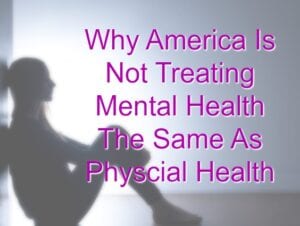 When coming down with a cold or the flu, most people don’t hesitate to take medication or visit the doctor. Most of us want to physically feel better fast. But, for some reason, when we have endless worries, deep depression, or a nagging sense of hopelessness, we plug along as though nothing is wrong. Hence the dire state of mental health in the U.S., where ¼ of adults suffer from a diagnosable mental disorder, yet less than half receive treatment.
When coming down with a cold or the flu, most people don’t hesitate to take medication or visit the doctor. Most of us want to physically feel better fast. But, for some reason, when we have endless worries, deep depression, or a nagging sense of hopelessness, we plug along as though nothing is wrong. Hence the dire state of mental health in the U.S., where ¼ of adults suffer from a diagnosable mental disorder, yet less than half receive treatment.
It’s 2018, and the stigma attached to mental illness is still very much alive and well. Negative stereotypes deeply affect those with mental health conditions and sometimes discourage someone from getting proper medical treatment. And new research suggests this stigma even creates an unconscious bias among many medical professionals. Quite simply: Many physicians often don’t take mental illnesses as seriously as physical ailments.
This study, found that doctors neglect to follow up or help manage their patients who have a diagnosis of depression or anxiety. Meanwhile, these same doctors are more likely to engage in treatment strategies with patients who have a chronic physical illness such as diabetes.
The findings are unsettling because many patients seek treatment for depression from their primary care doctors first. Many times, they don’t know who to turn besides a primary care doctor. Health insurance limitations and the stigma attached to seeing a mental health professional are also reasons people will seek out help from their doctor first. Interestingly enough, time restrictions and insurance issues are part of the reason why the study found a lack of care management for mental health from primary doctors in the first place.
Many experts are recommending that clinicians do depression screenings during a person’s regular physical exam to cope with the high proportion of depressed patients they see. While that’s a good start, it doesn’t guarantee follow-up care. Instead, follow-up is left to a mental health professional, which isn’t always an option for people.
What is most frustrating is the alarming takeaway that depression — while manageable — can occur multiple times throughout a person’s life but isn’t being treated. When it’s there, it’s often present for months and needs a lot of active management and often multiple types of treatments. Most people can recover from their depression, but they’re vulnerable to a return of it. Their mental health needs to be managed in order to prevent a relapse.
Depression and other mental health conditions operate very similar to physical conditions such as high blood pressure. Most people consider physical ailments significant enough to receive follow up care from a doctor. So why isn’t mental health regarded with the same weight? The bottom line is that treating mental health problems not only reduces individual pain but it actually has a significant impact on physical health.
Mental health issues are actually the leading cause of disability worldwide. Depression can prompt crippling symptoms such as headaches, gastrointestinal issues, fatigue, an increased risk for cardiovascular disease, strokes, and more. Research is continually showing that mental health disorders could be hereditary, and results in fundamental brain differences. These illnesses are as “real” and as important as physical issues. The brain and body are connected. The bottom line is that treating mental health problems not only reduces emotional pain but it actually has an impact on physical health.
America needs to start making systemic changes to make sure people with mental health conditions don’t slip through the cracks — one of which is our adjusting our cultural attitude. While a more accepting society will not cure mental illness, it will certainly help with its management. A loved one wouldn’t tell someone with diabetes to just “get over it.” And a doctor wouldn’t leave a patient with cancer to manage it on their own. These illnesses require effective treatment and proper care in order to live a fulfilling, healthy life.
Understanding the link between mind and body is a great step in developing strategies to reduce the incidence of co-existing conditions and support those already living with mental illnesses and chronic physical conditions. One such way to manage symptoms is to increase physical activity, access a healthy diet, ensure adequate income, and foster social support. This creates opportunities to enhance protective factors and reduce risk factors related to aspects of both mental and physical health.
 So why should you prioritize your mental health? Because caring for your mind as well as your body means you’ll not only live longer but better. Just as we have effective treatments for physical illnesses, there are therapies, medications, and lifestyle interventions that can ease mental suffering, especially if you get help at the earliest signs of a problem.
So why should you prioritize your mental health? Because caring for your mind as well as your body means you’ll not only live longer but better. Just as we have effective treatments for physical illnesses, there are therapies, medications, and lifestyle interventions that can ease mental suffering, especially if you get help at the earliest signs of a problem.
References:
Hugs, R. (November 21, 2013) Helpful Advice. [Cartoon] Robot Hugs. Retrieved from http://www.robot-hugs.com.
